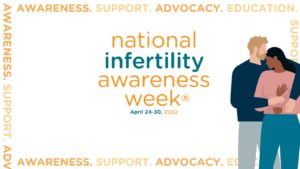Learn fast facts about infertility during NIAW 2022
 In honor of NIAW 2022, our Tennessee fertility clinic wants to share fast facts about infertility. These facts can help women and men better understand their fertility challenges and needs, so they can take the next step towards building a healthy family. NIAW, or National Infertility Awareness Week, is an ideal time to take charge of your fertility by equipping yourself with knowledge.
In honor of NIAW 2022, our Tennessee fertility clinic wants to share fast facts about infertility. These facts can help women and men better understand their fertility challenges and needs, so they can take the next step towards building a healthy family. NIAW, or National Infertility Awareness Week, is an ideal time to take charge of your fertility by equipping yourself with knowledge.
Fast facts about infertility that are important to know
The fertility specialists at our clinic understand how confusing fertility issues can be. As such, they want to give people information about infertility.
Age affects fertility. A woman’s egg quality and quantity often decline in her 30s, and significantly decrease after age 35 to 37. When she reaches 40, she has less than a 5% chance of conceiving each cycle.
Ovulation issues are a common cause of infertility. A primary fertility challenge many women experience is irregular or abnormal ovulation.
Infertility impacts both men and women. While many believe infertility primarily results from a woman’s fertility challenges, the male partner is the cause, or a contributing factor, of the fertility issues about 40% of the time.
Many people utilize fertility treatments. According to the CDC, more than 12% of women aged 15 to 49 have received infertility services.
Smoking affects fertility. Smoking cigarettes can significantly diminish a person’s fertility.
Weight is important. Having a significantly high or low body mass index BMI can influence fertility.
To receive high-quality fertility support, an important first step is determining why a person is having fertility struggles. The specialists at our Tennessee fertility clinic utilize blood tests, ultrasounds, sperm tests and other evaluations to help patients receive the right diagnosis.
Fast facts about fertility treatments
Discovering fast facts about infertility treatments during NIAW 2022 can help hopeful parents better understand how they can move past fertility struggles. There are various treatments that the patients at our Tennessee fertility clinic often utilize.
Intrauterine insemination, IUI. IUI consists of the doctor using a catheter to insert sperm into a patient’s uterus. The woman prepares for the IUI by tracking her ovulation and comes to our clinic for the procedure the day after ovulation. If a woman has ovulation issues she can take clomiphene citrate, or Clomid, to stimulate ovulation before the IUI.
In vitro fertilization, IVF. IVF involves the woman taking ovulation induction medications, while receiving regular monitoring at our clinic. When enough eggs mature, the doctor retrieves them during a short procedure. Next, an embryologist fertilizes the eggs with sperm from the woman’s partner or donor. The doctor then transfers a resulting embryo into her uterus.
IVF, in vitro fertilization with ICSI, intracytoplasmic sperm injection. ICSI consists of an embryologist injecting a single live sperm into the center of a mature egg during an IVF cycle.
Donor eggs or sperm. Women without viable eggs can utilize donor eggs. Men without viable sperm can use donor sperm.
The doctors at our clinic help patients discover why they’re struggling to conceive, then work with them to develop a treatment plan. With our help, many patients go on to become parents. Contact us to learn more fast facts about infertility.







